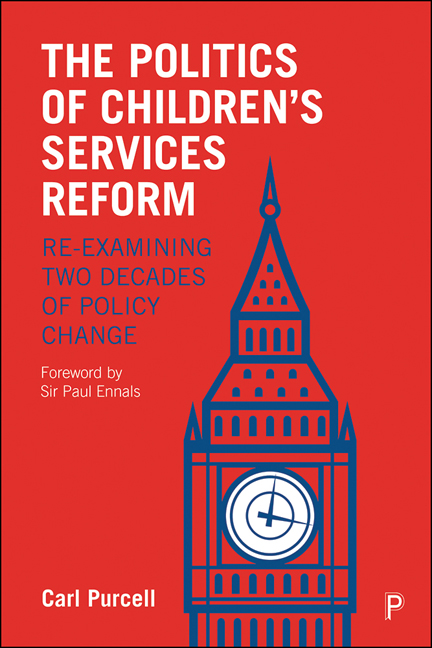Book contents
- Frontmatter
- Dedication
- Contents
- List of Abbreviations
- Acknowledgements
- Foreword
- Introduction
- 1 What Drives Children’s Services Reform?
- Part I Children’s Services Reform Under the Labour Government (1997– 2010)
- Part II Children’s Services Reform Under the Coalition and Conservative Governments (2010– 19)
- Conclusion: the Politics of Children’s Services Reform
- Appendix: Chronology of key Reports
- References
- Index
- Frontmatter
- Dedication
- Contents
- List of Abbreviations
- Acknowledgements
- Foreword
- Introduction
- 1 What Drives Children’s Services Reform?
- Part I Children’s Services Reform Under the Labour Government (1997– 2010)
- Part II Children’s Services Reform Under the Coalition and Conservative Governments (2010– 19)
- Conclusion: the Politics of Children’s Services Reform
- Appendix: Chronology of key Reports
- References
- Index
Summary
Protecting children from harm is one of the most important and undisputed responsibilities of the modern state. However, the nature of state involvement and the way in which it is organised and resourced differs between countries. Comparative research has identified two broad types of child welfare system. In child protection systems, the principal remit of welfare agencies is to identify and respond to actual or potential incidences of child abuse or maltreatment. These systems are characterised by highly legalistic interventions to protect children from deviant parents. In contrast, family service systems are characterised by a stronger spirit of partnership between the state and families facing difficulties, and an emphasis on working to prevent the escalation of needs and the necessity for coercive state intervention. It is suggested that child welfare systems reflect the broader cultural and socio-economic context of different countries. Child protection systems are found in neoliberal political economies with ‘safety-net’ welfare systems. Family service systems are generally located in socialdemocratic countries offering more generous welfare support (Gilbert et al, 2009: 174; Parton, 2014: ch 1).
There is a strong case for identifying the English child welfare system as a child protection system. National policy places a strong emphasis on the child protection responsibilities of welfare agencies, but particularly those of social work professionals. Under the Coalition and Conservative governments (2010– 19), policy initiatives prioritised the reform of social work and the restructuring of local welfare services, including the privatisation of child protection services (Jones, 2019). On the other hand, elements of the family service approach can also be found in the English system. Under the Labour government's (1997– 2010) Every Child Matters (ECM) programme (HM Government, 2003) there was a much stronger focus on the provision of preventative services. Local authority children's services departments, set up under ECM, retain responsibility for the commissioning and delivery of a diverse range of welfare services, including preventative services. They also continue to employ, directly or indirectly, a diverse workforce drawn from multiple professions and occupational groups in addition to social workers. Furthermore, the moral and economic case for the provision of preventative services, made by campaigning organisations in the children's sector over several decades, continues to command widespread support.
- Type
- Chapter
- Information
- The Politics of Children's Services ReformRe-examining Two Decades of Policy Change, pp. 1 - 4Publisher: Bristol University PressPrint publication year: 2020



